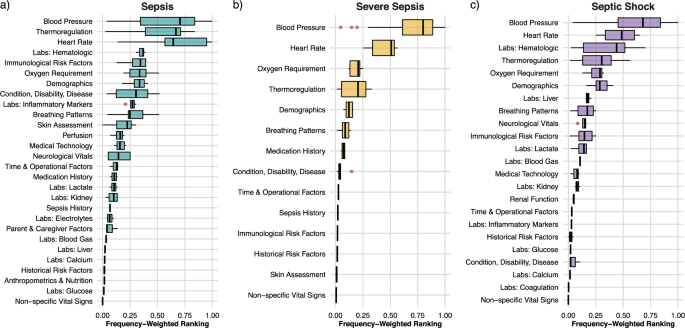A scoping review on pediatric sepsis prediction technologies in healthcare
IF 12.4
1区 医学
Q1 HEALTH CARE SCIENCES & SERVICES
引用次数: 0
Abstract
This scoping review evaluates recent advancements in data-driven technologies for predicting non-neonatal pediatric sepsis, including artificial intelligence, machine learning, and other methodologies. Of the 27 included studies, 23 (85%) were single-center investigations, and 16 (59%) used logistic regression. Notably, 20 (74%) studies used datasets with a low prevalence of sepsis-related outcomes, with area under the receiver operating characteristic scores ranging from 0.56 to 0.99. Prediction time points varied widely, and development characteristics, performance metrics, implementation outcomes, and considerations for human factors—especially workflow integration and clinical judgment—were inconsistently reported. The variations in endpoint definitions highlight the potential significance of the 2024 consensus criteria in future development. Future research should strengthen the involvement of clinical users to enhance the understanding and integration of human factors in designing and evaluating these technologies, ultimately aiming for safe and effective integration in pediatric healthcare.


求助全文
约1分钟内获得全文
求助全文
来源期刊

NPJ Digital Medicine
Multiple-
CiteScore
25.10
自引率
3.30%
发文量
170
审稿时长
15 weeks
期刊介绍:
npj Digital Medicine is an online open-access journal that focuses on publishing peer-reviewed research in the field of digital medicine. The journal covers various aspects of digital medicine, including the application and implementation of digital and mobile technologies in clinical settings, virtual healthcare, and the use of artificial intelligence and informatics.
The primary goal of the journal is to support innovation and the advancement of healthcare through the integration of new digital and mobile technologies. When determining if a manuscript is suitable for publication, the journal considers four important criteria: novelty, clinical relevance, scientific rigor, and digital innovation.
 求助内容:
求助内容: 应助结果提醒方式:
应助结果提醒方式:


